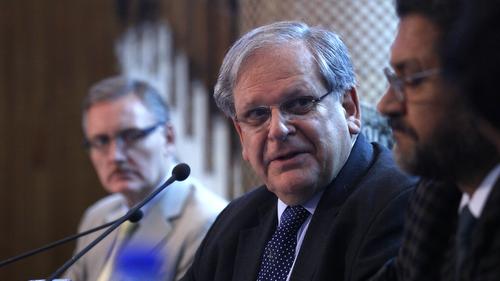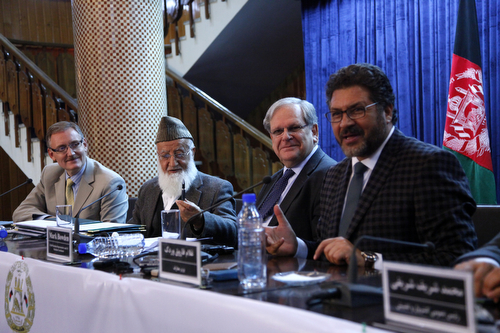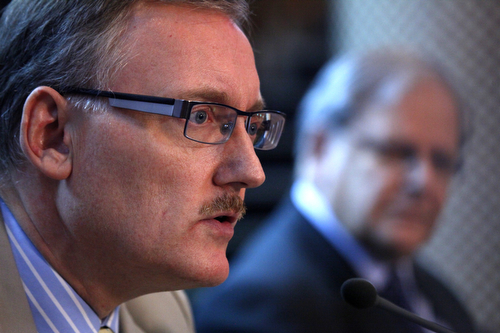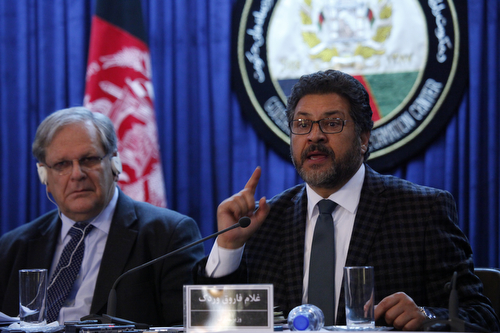KABUL - Coinciding with International Anti-Corruption Day, Afghan authorities today launched a United Nations-backed anti-corruption project aimed at supporting efforts to strengthen administrative systems and improve the technical capacity of key government institutions, as well as help citizen’s organizations to more effectively fight corruption at national and sub-national levels.Supported by the UN Development Programme (UNDP), the Afghanistan Integrity Initiative (AFII) will be implemented in partnership with the country’s Ministry of Education, the Ministry of Justice and the Supreme Audit Office, as well as non-governmental organizations and citizen organizations.
“A strong commitment to financial accountability by the government is particularly important at a time when the international community is increasing its on-budget assistance and I’m therefore pleased to note that the Afghanistan Integrity Initiative project will support the Supreme Audit Office to collaborate more effectively with the Legislature to better oversee the Executive Branch,” said the Resident Representative of the UN Development Programme (UNDP) and UN Resident Coordinator, Mark Bowden, at the launch in the Afghan capital of Kabul, which included a signing ceremony involving senior officials from the two ministries and the Supreme Audit Office.
“Aside from the Supreme Audit Office,” Mr. Bowden continued, “the UN also works with the Ministry of Justice and the Ministry of Education through its agencies, funds and programmes and we look forward to further improving the impact of that work through stronger institutional accountability mechanisms that the AFII project will help put in place.”
In a news release, UNDP stated that the importance of the AFII project is underscored by the fact that Afghanistan – according to the newly-released 2013 Transparency International’s Corruption Perception Index – continues to be ranked at the very bottom. The index, which ranks countries and territories based on how corrupt their public sector is perceived to be, lists Afghanistan in the 175th spot out of 177 countries, with the Democratic People's Republic of Korea and Somalia taking the two bottom spots.
“Afghanistan had the same ranking in 2012 which tells us that the public doesn’t see or experience positive change, but perceive corruption to continue at extreme levels. It also tells us that anti-corruption efforts by the government and the donor community alike have failed to deliver. We have let down the people of Afghanistan because we know that they rank corruption alongside poverty and security as one of the key concerns in their daily lives,” Mr. Bowden said, noting that factors such as an absence of a coherent anti-corruption policy and continuous delays in enactment of numerous key anti-corruption laws were among some of the factors that have hampered progress in the country’s anti-corruption efforts.
“Notwithstanding these immense challenges, we owe it to the people of Afghanistan and we owe it to the tax payers supporting our efforts to continue insisting on developing an anti-corruption formula that shows promise and results,” he added. “The importance of getting it right when it comes to fighting corruption cannot be overstated because corruption undermines the achievements and progress in all the development work that we do.”
According to UNDP, the AFII project aims to formulate a comprehensive whole-of-government National Anti-Corruption Policy and strengthen the national audit regime, and simplify and automate administrative processes of key government institutions to ensure a more transparent and effective provisioning of public services. The initiative will pilot new approaches that allow for public employees to report and redress injustice, while also providing space for citizens to report issues of maladministration, misconduct, and corruption in the justice and education sectors.
“This project on its own cannot achieve everything we would like to achieve – but it can make a small contribution,” UNDP’s Country Director, Alvaro Rodriguez, said at the launch. “There are specifically three areas in which the project will be focusing on. The first one is to strengthen the country’s audit regime, the second one is to improve the administrative processes and simplify them, and the third one is to provide more space for the civil servants and citizens of the country, Afghan men and women, to play a role in fighting corruption.”
In 2003, the General Assembly designated 9 December as International Anti-Corruption Day to raise awareness of corruption and of the role of the UN Convention against Corruption in combating and preventing it. The Convention, which entered into force in December 2005, is the only legally-binding universal anti-corruption instrument.
According to the UN, corruption is a complex social, political and economic phenomenon that affects all countries. It attacks the foundation of democratic institutions by distorting electoral processes, perverting the rule of law and creating bureaucratic quagmires whose only reason for existing is the soliciting of bribes.
“Corruption suppresses economic growth by driving up costs, and undermines the sustainable management of the environment and natural resources. It breaches fundamental human rights, exacerbates poverty and increases inequality by diverting funds from health care, education and other essential services. The malignant effects of corruption are felt by billions of people everywhere. It is driven by and results in criminal activity, malfunctioning state institutions and weak governance,” Secretary-General Ban Ki-moon said in his message for the Day.
“On this International Anti-Corruption Day, I urge Governments, the private sector and civil society to take a collective stand against this complex social, political and economic disease that affects all countries,” Mr. Ban added. “To achieve an equitable, inclusive and more prosperous future for all, we must foster a culture of integrity, transparency, accountability and good governance.”
The UN chief also noted that full implementation of the UN Convention against Corruption – which he described as “the paramount global framework for preventing and combating corruption” – depends crucially on effective prevention, law enforcement, international cooperation and asset recovery.
At the Kabul launch of the AFII, those in attendance included Afghanistan’s Minister of Justice, Habibullah Ghalib, and Minister of Education, Ghulam Farooq Wardak, as well as the Auditor-General from the Supreme Audit Office of Afghanistan, Mohammad Sharif Sharifi, and UNDP’s Mr. Rodriguez. All four officials were involved in signing on to the initiative. Representatives from multilateral and bilateral organizations, civil society organizations also attended.
In his comments to the launch, Mr. Wardak said that the $13.7 million project will significantly help improve the quality of services to the people of Afghanistan.
He also noted that the AFII will build on the achievements of an earlier joint project of the Ministry of Education and UNDP, which ran between 2010 and 2012 and aimed, among other targets, to improve complaints-registering mechanisms, improve working environments to better combat corruption and strengthen internal audit systems.
The AFII project is scheduled to run for three years from December 2013 to December 2016.
The project’s formulation has been guided by the Government’s key anti-corruption priorities as expressed in the Afghan National Development Strategy, the National Priority Program on Transparency and Accountability as well as the strategic development priorities of the Supreme Audit Office, the Ministry of Education and the Ministry of Justice.









